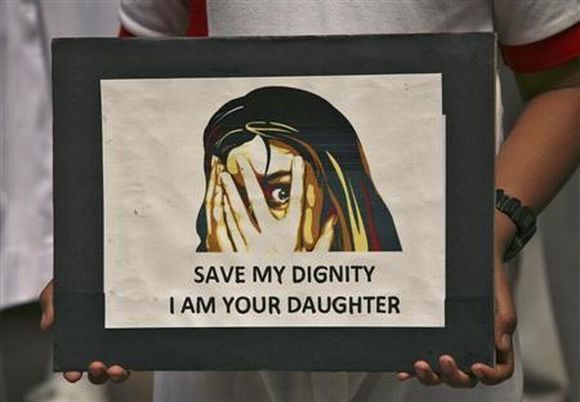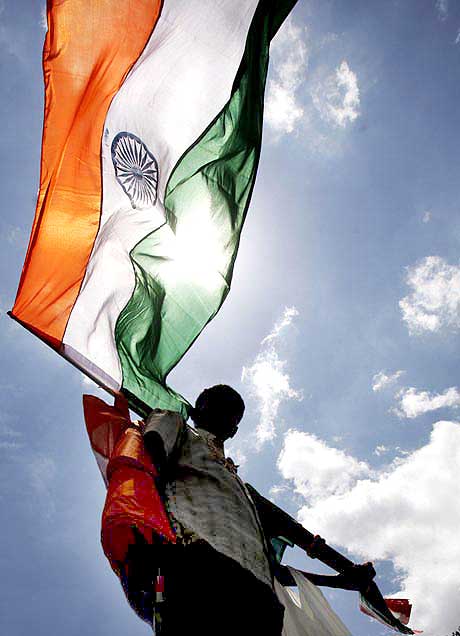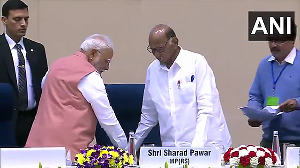'Sexual violence against women is not something unique to India but in our parts the victim must also have to contend with other burdens. Such as the notion of 'honour' and its loss,' says Aakar Patel.

March 8 is Women's Day, and I thought I should write about the most vulnerable part of our population and the one most discriminated against.
Defending Jawaharlal Nehru University in his speech which trended worldwide, its student leader Kanhaiya Kumar said two things which I did not know.
First, that it was the only university where the student body as a whole pressed for implementation of reservations. And second that 60 per cent of JNU's students are women.
I noticed that when he lists the groups for whom the JNU students are agitating he says Dalits, Adivasis, Women and Minorities.
The azadi slogans of the students have always included freedom from patriarchy and this is something unusual and to be supported by all of us.
It is a fine thing to be a middle class male in India because even in one of the poorest parts of the world, one is privileged.
The Indian woman, no matter what class and what caste she comes from, must suffer prejudice under a culture shot through with patriarchy.
Sexual violence against women is not something unique to India but it is true that in our parts the victim must also have to contend with other burdens. Such as the notion of 'honour' and its loss.
News on any given day will have the most horrific stories in which women are victimised even after crimes against them. This morning, as I write this, comes news of a 13-year-old girl who was whipped in public by a caste panchayat because her father abused her.
Is it surprising that women distrust the State and society when it comes to sexual violence? Some of the data on this will interest readers.
The government conducts the National Family Health Survey in households to feed the ministry of health and family welfare on maternal and child health, to inform policies. It also talks about the incidence of violence. This becomes complicated also because in India sexual violence by husbands -- marital rape -- is not criminalised -- so this doesn't get counted in this.
Here are the findings from the Indian government's survey, with a sample of 83,703 women, aged 15 to 49:
- Only one out of one hundred women who face sexual violence report it to the police.
- 5.7% of men use force to have sex with their wives when their wives refuse sexual intercourse with them, 19.8% 'get angry and reprimand her,' 6% refuse her financial support, 4.2 have have sex with another woman.
- 44% percent of women with no education have experienced violence at some time since the age of 15, and 26 percent have experienced violence in the past 12 months. These proportions decline steadily with education, and the corresponding proportions for women who have completed 12 or more years of education are 14 percent and 6 percent, respectively.
- Two out of three women who have ever experienced violence have not only never sought help, but have also never told anyone about the violence.
- A large majority of women who have experienced only sexual violence have never told anyone about the violence (85 percent), and only 8 percent have ever sought help.
- By contrast, 37 percent of women who have experienced both physical and sexual violence and 22 percent who have experienced only physical violence have sought help. Help seeking varies by the type of perpetrator. Women who have experienced violence by a former husband are the most likely to have sought help. This is to be expected since seeking help against spousal violence is likely to be a first step in being able to leave an abusive husband and ending the marriage.
- Overall, the data suggest that neither education nor wealth imply a greater likelihood that women will seek help against violence. There is even some indication that the most educated women and women in the highest wealth quintile are less likely to seek help than less educated or less wealthy women
- Abused women most often seek help from their own families.
- 72% of women who experienced only physical violence and 58% of women who experienced only sexual violence mention their own family as a source.
- Women in urban areas who experience sexual violence are more likely, and those who experience physical violence are less likely, than their rural counterparts to report each of the different sets of injuries.
- Few women seek help from any institutional sources such as the police, medical personnel, or social service organisations.
Aakar Patel is Executive Director, Amnesty International India. The views expressed here are personal.
- You can read more of Aakar's columns here











 © 2025
© 2025